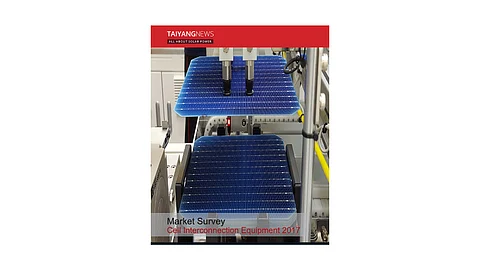

Solar cell interconnection is a crucial step in module making. Establishing an electrical connection between solar cells in a module not only defines the final shape and output power of the solar panel, depending on the strategy applied it also strongly impacts yield and throughput of the entire module factory.
During the early days of PV, interconnection was mainly accomplished manually – the cells were first "tabbed" and then connected to strings. Over time, the industry has gradually moved to automatic solutions, first using tabbers, then stringers, and today one-stop solutions, that combine the tabbing and stringing process in a single machine.
However, innovative technical approaches have been introduced recently. While module makers were primarily dependent on the cell level performance in the past, now it is much more about the PV panel performance itself. To put it simple, the interconnection part is becoming increasingly interesting as module manufacturers come up with new module designs and equipment providers offer new machines to enable high-throughput production of such solar panels. Our current market survey on cell interconnection equipment shows the latest trends and also products from the world leading vendors of these machines.
The survey features products from 12 companies, including the market leaders, from three continents – America, Asia and Europe:
Aaron Co. Ltd., Korea
Autowell Technology Co.Ltd., China
Ecoprogetti Srl, Italy
Hangzhou Con rmWare Technology Co. Ltd., China
M10 Industries AG, Germany
Meyer Burger, Switzerland
Mondragon Assembly, Spain
NingXia XN Automation Equipment Co.Ltd., China
P. Energy S.p.A., Italy
Schmid Group, Germany
Teamtechnik Maschinen und Anlagen GmbH, Germany
Xcell Automation, USA
Market survey in detail:
After an introduction (1), an overview (2), and providing the latest equipment improvements for cells with more busbars, half-cut cells, adhesive-based interconnections (3), the market survey includes a brief update on ribbon (4), followed by product descriptions for the different devices listed (5) and a chapter on advanced module interconnection technologies – including multi-busbar and smart-wire connection technology (SWCT) as well as shingles (6). A conclusions chapter analyses the survey content (7), followed by tables with detailed product specifications (8).
The TaiyangNews Market Survey on Cell Interconnection Equipment 2017 is for download free of charge here.
